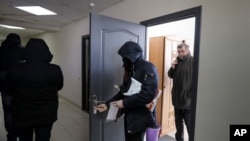The Minsk City Court has sentenced journalist Ales Lyubyanchuk to three years in prison amid a crackdown on independent media and civil society in Belarus under authoritarian ruler Alexander Lukashenko.
The Belarusian Association of Journalists (BAZh) said Thursday that Judge Alena Ananich had sentenced the journalist after finding him guilty of creating an extremist group and taking part in its activities.
BAZh demanded that Belarusian authorities immediately release Lyubyanchuk, saying his incarceration was "retaliation for his journalistic activities."
Lyubyanchuk, who cooperated with various media outlets, including Poland's Belsat news agency, actively covered nationwide mass protests sparked by an August 2020 presidential poll that Lukashenko said he won but the opposition said was rigged.
He was arrested several times over his coverage of the protests at the time and subsequently stopped his journalistic activities. However, in late May, Lyubyanchuk was arrested.
The Minsk-based Vyasna (Spring) human rights center has recognized him as a political prisoner.
The sentence came a day after the court sentenced noted investigative journalist Syarhey Satsuk to eight years in prison on charges of bribe-taking, inciting social hatred and abuse of office.
Satsuk, who also has been recognized by Belarusian human rights organizations as a political prisoner, rejected all the charges, calling them groundless.
Currently, 32 Belarusian journalists are in custody, many of whom have been jailed since the August 2020 presidential election.
Thousands have been detained during countrywide protests over the results, and there have been credible reports of torture and ill-treatment by security forces. Several people have died during the crackdown.
Lukashenko, in power since 1994, has refused to negotiate with the opposition, and many of its leaders have been arrested or forced to leave the country.
The United States, the European Union and several other countries have refused to acknowledge Lukashenko as the winner of the vote and have imposed several rounds of sanctions on him and his regime, citing election fraud and the crackdown.




